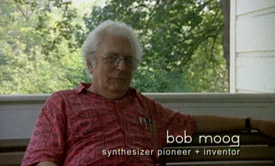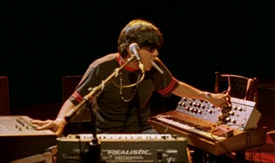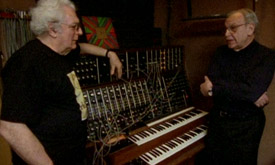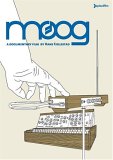| Reviews & Columns |
|
Reviews DVD TV on DVD Blu-ray 4K UHD International DVDs In Theaters Reviews by Studio Video Games Features Collector Series DVDs Easter Egg Database Interviews DVD Talk Radio Feature Articles Columns Anime Talk DVD Savant Horror DVDs The M.O.D. Squad Art House HD Talk Silent DVD
|
DVD Talk Forum |
|
|
| Resources |
|
DVD Price Search Customer Service #'s RCE Info Links |
|
Columns
|
|
|
Moog
Plexifilm // Unrated // May 31, 2005 // Region 0
List Price: $24.98 [Buy now and save at Amazon]
Moog is the latest music-themed documentary to come from Plexifilm, a company whose catalog also includes the They Might Be Giants doc Gigantic and Wilco's I Am Trying to Break Your Heart.  Their latest effort is helmed by Hans Fjellestad (Frontier Life) and focuses its 16mm lens on Bob Moog, the inventor of the synthesizer. Moog doesn't unfold with narration over still photographs taken decades ago as Moog isn't just the subject; he's the driving force of the documentary. The majority of the discussion is driven by Moog himself, and aside from some of the live performances scattered throughout, he appears in literally every single scene in the movie. Moog discusses the interaction between musician and instrument as well as commenting on his early days as a theremin salesman, the evolution of the synthesizer, and the cementing of its place in the musical landscape. Although Moog is inarguably the dominant presence in the documentary, Moog also features contributions from musicians as varied as Rick Wakeman and DJ Spooky, as well as live performances from the likes of Stereolab and Money Mark & Mixmaster Mike.
Their latest effort is helmed by Hans Fjellestad (Frontier Life) and focuses its 16mm lens on Bob Moog, the inventor of the synthesizer. Moog doesn't unfold with narration over still photographs taken decades ago as Moog isn't just the subject; he's the driving force of the documentary. The majority of the discussion is driven by Moog himself, and aside from some of the live performances scattered throughout, he appears in literally every single scene in the movie. Moog discusses the interaction between musician and instrument as well as commenting on his early days as a theremin salesman, the evolution of the synthesizer, and the cementing of its place in the musical landscape. Although Moog is inarguably the dominant presence in the documentary, Moog also features contributions from musicians as varied as Rick Wakeman and DJ Spooky, as well as live performances from the likes of Stereolab and Money Mark & Mixmaster Mike.
When Moog opened to a limited theatrical release late last year, the critical reception was often tepid and somewhat deservedly so. Moog doesn't stick to any sort of structure. The documentary isn't really about the man and isn't really about the synthesizers that bear his name, falling into some indeterminate point in the middle. It doesn't follow much of a linear narrative, haphazardly leaping around from topic to topic and randomly jumping to different time periods. Viewers who aren't familiar with Moog synthesizers aren't likely to come away with much, and those with a keener interest may be entertained well enough as I was, but I can't say that I feel more informed now than I was before tossing this disc into my DVD player.
There's too much ground that should've been covered but is either largely glossed over or ignored entirely. "Switched on Bach", the album that took synthesizers out of the niche of experimental music and into the mainstream, is mentioned only in passing. I can't remember if Wendy Carlos is even mentioned by name, and the lack of an interview seems like a glaring omission. The barrage of Moog-centric cover albums is also ignored. The cultural impact the Moog synthesizer had is noted, but the documentary just leaves those as statements, never expanding upon them or exploring how music was changed. Watching the documentary, viewers might leave thinking that the only synthesizers Moog ever made were the modular boxes and the Minimoog. Not that I expect Moog to read like a vintage Moog Music catalog, but still, the diversity and popularity of the line is never touched upon. The company's declining fortunes in the '80s as digital keyboards became increasingly dominant, the legal struggles over the Moog Music name and the knock-off synths that were released, the Moog revival that started in the mid-'90s (I'd have thought Matt Sharp would have been a natural interview subject too, but neither he nor The Rentals warrant a mention, apparently), the fairly recent launch of the first new Moog synthesizer in years... Any one of those topics would have been more interesting to me than Bob Moog talking about his organic vegetable garden and dead chickens. That's just straight off the top of my head, and I'm not even as informed about the life of Bob Moog and his synthesizers as I'm sure a lot of people reading this review may be. Director Hans Fjellestad indicates that he wanted Moog to be about the man in his own words, not play like a dry history of synthesizer tech, but I didn't find that it did either remarkably well.
Any one of those topics would have been more interesting to me than Bob Moog talking about his organic vegetable garden and dead chickens. That's just straight off the top of my head, and I'm not even as informed about the life of Bob Moog and his synthesizers as I'm sure a lot of people reading this review may be. Director Hans Fjellestad indicates that he wanted Moog to be about the man in his own words, not play like a dry history of synthesizer tech, but I didn't find that it did either remarkably well.
Moog is light entertainment for synthesizer enthusiasts. The documentary is too scattershot and ignores a large number of key topics, and what's remaining is so randomly distributed that I'm not sure it even qualifies as a story. Devoted fans are unlikely to glean much insight, and there's not enough substance to convert the uninitiated. As an hour-long love letter to analog synthesizers and the pioneer who invented them, Moog works reasonably well, but there's something naggingly insubstantial about it to warrant much of an enthusiastic recommendation.
Video: Moog was shot on 16mm film, and as the liner notes point out, it's appropriate that a documentary focusing so heavily on analog synthesizers be recorded on an analog format. The documentary is letterboxed to 1.66:1 or so and is not enhanced for widescreen displays. The lack of anamorphic enhancement probably doesn't have too much of an impact, as Moog was shot for so little money that I don't think the word "budget" really even applies. The photography is expectedly grainy, and clarity and detail vary by location. The film stock used gives Moog an indeterminate quality whose age would be nearly impossible to pinpoint if not for the presence of Moog's new Voyager synth and bands like Stereolab. Otherwise, you could've told me this was shot in the late '70s and I probably would have believed you. The image does occasionally shimmer somewhat, but there aren't any dramatic flaws along those lines. Considering its numerous limitations, this isn't a bad presentation.
Audio: The Dolby Digital stereo soundtrack (224Kbps) is typical documentary fare. The conversations are the most essential part of the track and typically come through reasonably well. However, some of Moog was recorded in less-than-ideal conditions, and in noisy backstage halls or studios with music buzzing in the background, it may require a little bit of effort to concentrate on what's being said. Synthesizers are frequently heard, and that distinctively throaty low-end of the Moog filter comes through reasonably well. There's a fair amount of live music interspersed throughout, and although the recordings as a whole are somewhat unremarkable, the analog synths do sound rather nice. Overall, pretty much what you'd expect. There are no alternate soundtracks, subtitles, or closed captions.
Supplements: The extras on Moog open with twenty minutes of deleted scenes -- Moog on the various pronounciations of his surname, a conversation with Stereolab's Tim Gane along with some additional live footage, Charlie Clouser from Nine Inch Nails conversing with Bob Moog about (as well as playing) the theremin, Moog commenting about life in New York, Walter Sears on the origin of the ribbon controller, and some additional screen time for thereminist Pamelia Kurstin, DJ Spooky, Herb Deutsch, and Gershon Kingsley.
and some additional screen time for thereminist Pamelia Kurstin, DJ Spooky, Herb Deutsch, and Gershon Kingsley.
There are also additional live performances by Money Mark and Woody Jackson, Tino Corp. and Charlie Clouser, and The Album Leaf, running just shy of fourteen minutes total. All three veer pretty drastically far from my usual taste in music, so I'm not entirely sure what to say about them. Director Hans Fjellestad contributes a ten minute sort of condensed audio commentary, noting his introduction to the Minimoog, details about the title sequence, all the different locations where they filmed, and what he was trying to accomplish with the documentary. Moog includes a commercial for Schaefer Beer with Edd Kalehoff manning a bank of synths, and this spot is also available separately in the extras. A letterboxed trailer rounds out the extras.
Moog comes cradled in a transparent keepcase, and the design of the packaging and the provided liner notes are both particularly well-done. The 4x3 static menus have the same animated-Flash-cartoon appearance as the opening titles
Conclusion: Moog is certainly entertaining enough that enthusiasts should still find it worth a rental, but the documentary isn't substantial or comprehensive enough for me to recommend it as a purchase sight-unseen. Rent It.
 Their latest effort is helmed by Hans Fjellestad (Frontier Life) and focuses its 16mm lens on Bob Moog, the inventor of the synthesizer. Moog doesn't unfold with narration over still photographs taken decades ago as Moog isn't just the subject; he's the driving force of the documentary. The majority of the discussion is driven by Moog himself, and aside from some of the live performances scattered throughout, he appears in literally every single scene in the movie. Moog discusses the interaction between musician and instrument as well as commenting on his early days as a theremin salesman, the evolution of the synthesizer, and the cementing of its place in the musical landscape. Although Moog is inarguably the dominant presence in the documentary, Moog also features contributions from musicians as varied as Rick Wakeman and DJ Spooky, as well as live performances from the likes of Stereolab and Money Mark & Mixmaster Mike.
Their latest effort is helmed by Hans Fjellestad (Frontier Life) and focuses its 16mm lens on Bob Moog, the inventor of the synthesizer. Moog doesn't unfold with narration over still photographs taken decades ago as Moog isn't just the subject; he's the driving force of the documentary. The majority of the discussion is driven by Moog himself, and aside from some of the live performances scattered throughout, he appears in literally every single scene in the movie. Moog discusses the interaction between musician and instrument as well as commenting on his early days as a theremin salesman, the evolution of the synthesizer, and the cementing of its place in the musical landscape. Although Moog is inarguably the dominant presence in the documentary, Moog also features contributions from musicians as varied as Rick Wakeman and DJ Spooky, as well as live performances from the likes of Stereolab and Money Mark & Mixmaster Mike. When Moog opened to a limited theatrical release late last year, the critical reception was often tepid and somewhat deservedly so. Moog doesn't stick to any sort of structure. The documentary isn't really about the man and isn't really about the synthesizers that bear his name, falling into some indeterminate point in the middle. It doesn't follow much of a linear narrative, haphazardly leaping around from topic to topic and randomly jumping to different time periods. Viewers who aren't familiar with Moog synthesizers aren't likely to come away with much, and those with a keener interest may be entertained well enough as I was, but I can't say that I feel more informed now than I was before tossing this disc into my DVD player.
There's too much ground that should've been covered but is either largely glossed over or ignored entirely. "Switched on Bach", the album that took synthesizers out of the niche of experimental music and into the mainstream, is mentioned only in passing. I can't remember if Wendy Carlos is even mentioned by name, and the lack of an interview seems like a glaring omission. The barrage of Moog-centric cover albums is also ignored. The cultural impact the Moog synthesizer had is noted, but the documentary just leaves those as statements, never expanding upon them or exploring how music was changed. Watching the documentary, viewers might leave thinking that the only synthesizers Moog ever made were the modular boxes and the Minimoog. Not that I expect Moog to read like a vintage Moog Music catalog, but still, the diversity and popularity of the line is never touched upon. The company's declining fortunes in the '80s as digital keyboards became increasingly dominant, the legal struggles over the Moog Music name and the knock-off synths that were released, the Moog revival that started in the mid-'90s (I'd have thought Matt Sharp would have been a natural interview subject too, but neither he nor The Rentals warrant a mention, apparently), the fairly recent launch of the first new Moog synthesizer in years...
 Any one of those topics would have been more interesting to me than Bob Moog talking about his organic vegetable garden and dead chickens. That's just straight off the top of my head, and I'm not even as informed about the life of Bob Moog and his synthesizers as I'm sure a lot of people reading this review may be. Director Hans Fjellestad indicates that he wanted Moog to be about the man in his own words, not play like a dry history of synthesizer tech, but I didn't find that it did either remarkably well.
Any one of those topics would have been more interesting to me than Bob Moog talking about his organic vegetable garden and dead chickens. That's just straight off the top of my head, and I'm not even as informed about the life of Bob Moog and his synthesizers as I'm sure a lot of people reading this review may be. Director Hans Fjellestad indicates that he wanted Moog to be about the man in his own words, not play like a dry history of synthesizer tech, but I didn't find that it did either remarkably well. Moog is light entertainment for synthesizer enthusiasts. The documentary is too scattershot and ignores a large number of key topics, and what's remaining is so randomly distributed that I'm not sure it even qualifies as a story. Devoted fans are unlikely to glean much insight, and there's not enough substance to convert the uninitiated. As an hour-long love letter to analog synthesizers and the pioneer who invented them, Moog works reasonably well, but there's something naggingly insubstantial about it to warrant much of an enthusiastic recommendation.
Video: Moog was shot on 16mm film, and as the liner notes point out, it's appropriate that a documentary focusing so heavily on analog synthesizers be recorded on an analog format. The documentary is letterboxed to 1.66:1 or so and is not enhanced for widescreen displays. The lack of anamorphic enhancement probably doesn't have too much of an impact, as Moog was shot for so little money that I don't think the word "budget" really even applies. The photography is expectedly grainy, and clarity and detail vary by location. The film stock used gives Moog an indeterminate quality whose age would be nearly impossible to pinpoint if not for the presence of Moog's new Voyager synth and bands like Stereolab. Otherwise, you could've told me this was shot in the late '70s and I probably would have believed you. The image does occasionally shimmer somewhat, but there aren't any dramatic flaws along those lines. Considering its numerous limitations, this isn't a bad presentation.
Audio: The Dolby Digital stereo soundtrack (224Kbps) is typical documentary fare. The conversations are the most essential part of the track and typically come through reasonably well. However, some of Moog was recorded in less-than-ideal conditions, and in noisy backstage halls or studios with music buzzing in the background, it may require a little bit of effort to concentrate on what's being said. Synthesizers are frequently heard, and that distinctively throaty low-end of the Moog filter comes through reasonably well. There's a fair amount of live music interspersed throughout, and although the recordings as a whole are somewhat unremarkable, the analog synths do sound rather nice. Overall, pretty much what you'd expect. There are no alternate soundtracks, subtitles, or closed captions.
Supplements: The extras on Moog open with twenty minutes of deleted scenes -- Moog on the various pronounciations of his surname, a conversation with Stereolab's Tim Gane along with some additional live footage, Charlie Clouser from Nine Inch Nails conversing with Bob Moog about (as well as playing) the theremin, Moog commenting about life in New York, Walter Sears on the origin of the ribbon controller,
 and some additional screen time for thereminist Pamelia Kurstin, DJ Spooky, Herb Deutsch, and Gershon Kingsley.
and some additional screen time for thereminist Pamelia Kurstin, DJ Spooky, Herb Deutsch, and Gershon Kingsley. There are also additional live performances by Money Mark and Woody Jackson, Tino Corp. and Charlie Clouser, and The Album Leaf, running just shy of fourteen minutes total. All three veer pretty drastically far from my usual taste in music, so I'm not entirely sure what to say about them. Director Hans Fjellestad contributes a ten minute sort of condensed audio commentary, noting his introduction to the Minimoog, details about the title sequence, all the different locations where they filmed, and what he was trying to accomplish with the documentary. Moog includes a commercial for Schaefer Beer with Edd Kalehoff manning a bank of synths, and this spot is also available separately in the extras. A letterboxed trailer rounds out the extras.
Moog comes cradled in a transparent keepcase, and the design of the packaging and the provided liner notes are both particularly well-done. The 4x3 static menus have the same animated-Flash-cartoon appearance as the opening titles
Conclusion: Moog is certainly entertaining enough that enthusiasts should still find it worth a rental, but the documentary isn't substantial or comprehensive enough for me to recommend it as a purchase sight-unseen. Rent It.
|
| Popular Reviews |
| Sponsored Links |
|
|
| Sponsored Links |
|
|
| Release List | Reviews | Shop | Newsletter | Forum | DVD Giveaways | Blu-Ray | Advertise |
|
Copyright 2024 DVDTalk.com All Rights Reserved. Legal Info, Privacy Policy, Terms of Use,
Manage Preferences,
Your Privacy Choices | |||||||













